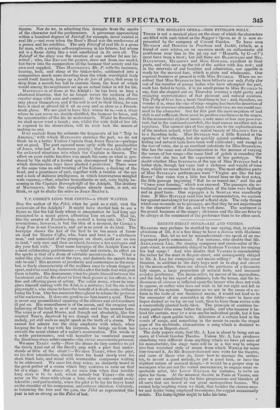THE BEGGAR'S OPERA—MISS BYF1ELD'S POLLY.
THERE is not a musical piece on the stage of which the characters are filled with such talent as the Beggar's Opera, as it is now re- presented by the company of Covent Garden. To have seen MUNDEN and DowroN in Peachunt and Lockit, (which, as a friend of ours relates, on an occasion made an enthusiastic old gentleman near him in the pit cry out " Hogarth, by G—d !") must have been a treat ; but still there are BLANCHARD and Mrs. DAVENPORT, MEADOWS and MISS GOWARD, excellent in their parts, and who serve up the wit of the author with due zest ; and in the intervals of our laughter aml admiration, our appetite is ready for the musical fare, which is plain and wholesome. Our especial business at present is with Miss Byaiaao. When we re- collect that Miss STEPHENS has been hitherto our only Polly (for out of the number of young ladies who have attempted the part, each has failed in turn), it is no small praise to Miss BYFIELD to say, that she stepped out on Thursday evening a right pretty and engaging representative of that pleasant and natural creature. The Polly of GAY has a heart throbbing in her : and, therefore, no wonder it is, since the vice of stage-singing has been the desertion of nature for nonsense ornament, that with such vice, no one could suc- ceed in the character. But for this part the mere negation of bad style is not sufficient, there must be positive excellences in the singer. In the ornamental styles of music, a note more or less may pass cur- rent, but in the sustained cantabile, the least excess on either side is repulsive. The earnest airs of this opera are to the sophistications of the modern school, what the naked beauty of Mwroar's Eve is to a flaunting belle. Miss BYFIELD was a little flurried at the opening of her attempt, but she quickly gained confidence. Her feeling and natural taste have been well cultivated ; and except in the tone of voice, she is an excellent substitute for Miss STEPHENS. She has the same sort of discrimination in the manner of varying the verses of her songs—the same kind of polish in rounding the close—but she has not the experience of her prototype. We doubt whether Miss STEPHENS at the age of Miss BYFIELD had a better style, though her voice had a richness and weight of tone then, which we never heard in any singer. The most effective parts of Miss BYFIELD'S performance were "Virgins are like the fair flower" (her voice was a little too forced here on the first note), the little passage beginning " But he so teased me," and the air "Cease your funning," which was encored. The passages she in- troduced as ornaments on the repetition of the, tune were brilliant and in good taste. One arpeggio a la SONTAG was excellently done. If Miss BYFIELD read this last commendation, we caution her against mistaking it for praise of a florid style. The only things which can reconcile us to passages, are that they be not impertinent to the character of the air, and be well done. The sentiment is the grand business of the singer ; divisions and the like are fitter to be always at the command of the performer than to be often used.


















 Previous page
Previous page